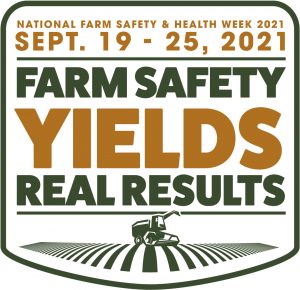Agricultural Fertilizer & Chemical Safety Webinars: Thursday, September 23, 2021
 AgriSafe is hosting a variety of free, daily webinars during National Farm Safety and Health Week, September 19-25, 2021. Click on the event titles below for more information and to register.
AgriSafe is hosting a variety of free, daily webinars during National Farm Safety and Health Week, September 19-25, 2021. Click on the event titles below for more information and to register.
Anhydrous Ammonia Safety for Farmworkers (1:00 pm EDT)
Anhydrous ammonia (NH3) is an effective nitrogen crop fertilizer used throughout the Midwest and beyond. Anhydrous ammonia is potentially dangerous, as it seeks water from the nearest source, which may be the human body – especially the eyes, lungs, and skin because of their high moisture content.
Few problems occur when anhydrous ammonia is handled properly and applied as intended. However, it is important for all individuals working with this type of fertilizer to understand the potential health risks, necessary safety precautions, and proper response in the event of exposure. The focus of this training is on anhydrous ammonia safety during transport and application, including the anatomy of the nurse tank and toolbar, safety inspection processes, hitching, and unhitching safety, personal protective equipment (PPE), rural roadway safety, and first aid/emergency procedures.
Intended Audience: Farm/Ranch owners and operators, health and safety professionals, safety officers or specialists, managers, supervisors, safety coordinators, health safety and environmental interns, and any person or persons who serve as safety personnel in an agricultural setting.
Best Personal Protective Equipment (PPE) to Protect Your Lungs (3:00 pm EDT)
Respiratory protection strategies for women working in agriculture can be a challenge. Purchasing respiratory protective equipment and achieving proper fit is often difficult. This one-hour webinar program will address dangerous exposures in agricultural work and the importance of respiratory protective equipment for women. It will include training tips and evidence-based resources for use in clinical practice and worker education
Intended Audience: The primary audience for this program will be rural health care providers, educators, and agribusiness safety managers
